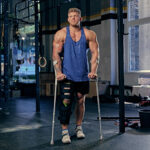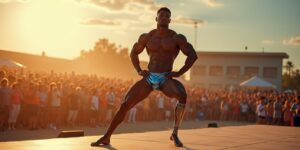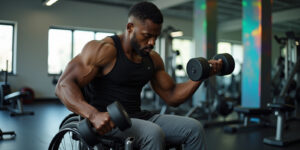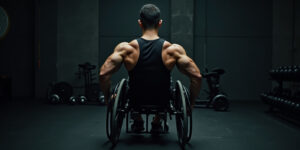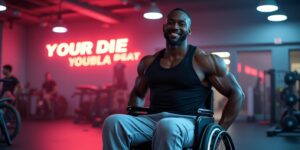Everyone deserves to have an inclusive bodybuilding space that caters to everyone. Gyms can play a significant role in helping people with disabilities enjoy bodybuilding. Gyms can provide equipment and facilities that are accessible, as well as instructors and trainers who are sensitive to the needs of people with disabilities. This blog will discuss how gyms can help disabled bodybuilders form supportive communities, overcome barriers to accessibility, and understand the benefits of bodybuilding for people with disabilities.
How Gyms Can Help Disabled Bodybuilders?
For many people with disabilities, staying physically active can be a challenge. However, regular exercise can improve overall health and well-being, increase strength and mobility, and boost self-confidence. Bodybuilding, in particular, can be a great way for people with disabilities to build strength, increase muscle mass, and improve their overall physical fitness. However, many traditional gyms may not be equipped to cater to the needs of disabled bodybuilders. In this write-up, we will discuss how gyms can help disabled bodybuilders and what considerations should be taken into account.
- Accessibility
The first step in making a gym more inclusive for disabled bodybuilders is to ensure that the facility is accessible. This means making sure that the gym is wheelchair accessible, that there are ramps instead of stairs, and that there are accessible toilets and changing rooms. Additionally, gym equipment should be placed at an appropriate height and distance from each other to allow ease of use for disabled individuals.
- Personalized Training
Another way that gyms can help disabled bodybuilders is by providing personalized training. Many disabled individuals have specific physical limitations or medical conditions that need to be taken into account when developing an exercise plan. A personal trainer who is experienced in working with disabled individuals can provide tailored guidance, support, and motivation that caters to the unique needs of each individual.
- Adaptive Equipment
In addition to personalized training, gyms can also help disabled bodybuilders by providing adaptive equipment. This includes equipment that is specifically designed to accommodate individuals with disabilities, such as machines with adjustable seats and handles, or machines that can be operated with one hand. It is important that gym staff are trained in the use of adaptive equipment and can provide assistance when needed.
- Inclusive Environment
Creating an inclusive environment is also essential for disabled bodybuilders. Gyms can ensure that their staff and trainers are educated on how to interact with disabled individuals and understand their unique needs. This can help to create a more welcoming and supportive atmosphere for all gym members. Additionally, hosting events or classes specifically for disabled individuals can help to build a sense of community and support.
- Partnering with Disability Organizations
Gyms can also partner with disability organizations to better serve disabled bodybuilders. These organizations can provide resources, guidance, and support to gyms looking to become more inclusive. In addition, partnering with disability organizations can help to raise awareness of the importance of physical activity and exercise for disabled individuals.
- Offering Competitive Opportunities
Finally, gyms can help disabled bodybuilders by providing opportunities for competitive bodybuilding. Competing in bodybuilding competitions can be a great way for disabled individuals to showcase their strength and abilities, and to feel a sense of achievement. Gyms can help by providing training and support for competitive events, as well as by promoting and hosting competitions themselves.

How Bodybuilding Can Help People with Disabilities?
Bodybuilding is a sport that involves developing muscle mass and strength through various resistance exercises such as weightlifting, bodyweight exercises, and resistance machines. While bodybuilding is often associated with aesthetic goals such as sculpting a toned physique, it can also provide numerous benefits to people with disabilities.
People with disabilities face unique challenges in maintaining their physical health and wellbeing. Many disabilities can limit mobility and cause muscle weakness, making it difficult to engage in physical activity. However, bodybuilding offers a variety of benefits that can help people with disabilities improve their overall health and quality of life.
- One of the main benefits of bodybuilding for people with disabilities is improved muscle strength and endurance. By engaging in resistance exercises, people with disabilities can increase their muscle mass and improve their ability to perform daily activities such as getting in and out of bed, getting dressed, and completing household tasks. This can help to improve overall physical function and reduce the risk of injuries or falls.
- In addition to improving muscle strength and endurance, bodybuilding can also help to improve cardiovascular health. Many bodybuilding exercises such as circuit training, high-intensity interval training, and cardiovascular exercise can help to improve heart health and reduce the risk of heart disease. This is particularly important for people with disabilities who may be at increased risk of heart disease due to their condition.
- Bodybuilding can also help to improve mental health and wellbeing. Exercise has been shown to improve mood, reduce stress and anxiety, and improve overall quality of life. For people with disabilities who may face additional challenges in their daily lives, bodybuilding can provide a healthy outlet for stress relief and help to improve mental health.
- Another benefit of bodybuilding for people with disabilities is improved self-confidence and self-esteem. By achieving personal fitness goals and improving physical function, people with disabilities can develop a sense of pride and accomplishment. This can help to improve self-confidence and self-esteem, leading to a more positive outlook on life.
- Finally, bodybuilding can help to build a sense of community and support. Many bodybuilding gyms and fitness programs offer a supportive environment where people can connect with others who share similar goals and challenges. This sense of community can provide a valuable source of motivation and encouragement, helping people with disabilities to stay on track with their fitness goals.
Bodybuilding can provide numerous benefits to people with disabilities, including improved muscle strength and endurance, improved cardiovascular health, improved mental health and wellbeing, improved self-confidence and self-esteem, and a sense of community and support. By incorporating bodybuilding into their fitness routine, people with disabilities can improve their overall health and quality of life.
Let’s Sum Up
Inclusive spaces are not just about making physical changes to a gym but also about changing mindsets. By creating more bodybuilding-friendly spaces and educating gym-goers on bodybuilding and disability, gyms can help disabled bodybuilders get the support they need. If you’re an owner or manager of a gym or fitness center and want to learn how to make your gym more accessible, check out our ebook ‘Creating Inclusive Spaces: A Guide for Gyms.’ This ebook is filled with advice from experts who have worked in the fitness industry for years and helped create more inclusive spaces.

